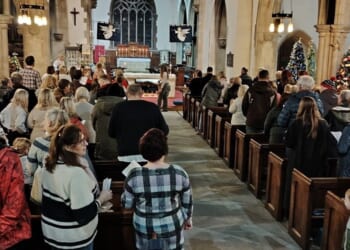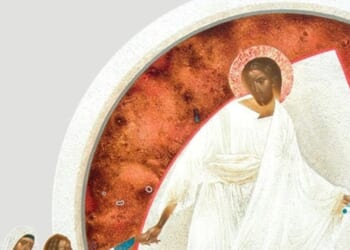AS THE leaves curl and the nights draw in, the season tilts us towards November — the “month of the dead”, according to the Orkney writer George Mackay Brown. With the going down of the sun, November brings the dead back to memory: guys and ghouls; saints and souls; all those who have laid down their lives. Remembrancetide reminds us that, in the words of the old burial service, “in the midst of life we are in death”. As the fields whiten, the season proclaims that loss abounds: it is woven into our human tapestry.
Yet we hardy need the reminder. Our lives are freighted with loss. We experience it in many guises. It comes to us, not only in the well-worn cloak of bereavement, but plays in 10,000 places: a wrinkle, a grey hair, a diagnosis, a failure, a break-up. Grief — our natural response to loss — is an almost constant companion. We may not experience overt grief, day by day, but it often lurks in the shallows, and rises at a reminder.
The all-pervasive nature of loss and grief places a question mark over human life. Is life merely one long tale of woe, a vale of tears from which there is no escape? Or might it be that something as universal as loss and grief could, in some way, be adaptive for the human species? To put it differently: can we find in grief any redemptive possibilities?
THE writer and musician Nick Cave lost his teenage son in an accident. In his book Faith, Hope and Carnage (Books, 25 November 2022), he reflects on his grief and its “mutinous energy”. He speaks of “the idea of grief as a gift”, and witnesses to his experience that grief brought him closer to “the fundamental essence of things”. More remarkable still, he observes that “it actually feels like grief and God are somehow intertwined.”
The experience of many who have been racked by grief is that, at times, a surprising invitation can be discerned in the darkness and pain. Grief has been known to enlarge our humanity, change our perspective, and connect us in new ways to ourselves, to others, and to the divine. Where this is so, it seems appropriate to speak of the “spirituality” of grief.
This might seem like an outlandish claim. Loss, after all, asks to be mourned, and mourning has no shortcuts. The process of mourning is enabled when we allow ourselves to experience grief in all its rawness — and do not pretend that grief is somehow OK, or push it underground in an attempt to “be strong”. If there is a spirituality to grief, it must begin by acknowledging the painful necessity of grief, while remaining open to hearing a voice in the darkness, an invitation to greater connection, insight, and growth.
IN MY book All Is Not Loss, I explore some of the ways in which we might hear grief’s invitation. This may emerge in the midst of bereavement; but we may equally encounter the spirituality of grief in the face of many other kinds of loss, including mortality, dependence, parting, nostalgia, failure, shame, and regret. Each chapter of the book takes up a different theme.
How can grief give back to us? In bereavement, grieving people can often discern, eventually, an invitation to keep living: to forge new connections, reframe their lives, and grow through grief. The story goes that the violinist Itzhak Perlman once played a concert on an instrument with one broken string. Afterwards, he said, “Our job is to make music with what remains.” It is an apt metaphor for the task that many bereaved people face.
OTHER forms of loss also hold out promise. As we age, we encounter — with increasing urgency — the fact of our mortality. The discovery that our years are finite is a loss. There are only so many summers. Yet the wisdom of the centuries (“memento mori”) invites us to remember that we are to die. There is a paradox here: remembering death enhances life. The wound of mortality invites us to live life to the full.
Many of us fear the prospect of ageing, illness, progressive disability, and dying. These experiences are laced with loss. They are unlikely places in which to discover the gifts of grief. Yet the experience of some who have testified from a place of painful dependence is that all is not loss, even in the midst of their suffering. There is still a life to be lived.
Parting is a loss that we experience throughout our lives. The “empty nest” when children leave home can become a significant loss, whose grief is often played down. Recently, I spoke to a woman who had just returned from dropping off her son at university. On the two-hour journey home, she had cried all the way. Was this his first year, I wondered? No, she explained: he had been working there for a decade. Such partings can be painful — but they may be necessary losses that allow love to be proved in the act of letting go.
A CURIOUS loss is the experience of nostalgia. At root, the word implies “anguish for home”, and yet there is something about this loss which we almost enjoy. Sepia-tinted memories tug at our hearts and make us long to return: childhood holidays, rural idylls, vinyl records, old haunts. Yet, even as we wallow in delicious longing, nostalgia invites us to wonder what it is that we are really after. A forgotten part of ourselves, perhaps? Or a home for our restless hearts — restless, as St Augustine prayed, “until they find their rest in thee”?
The loss felt from failure may speak to us in a different way. It is only recently that the English language has spliced human endeavour into the binary categories of success and failure. Still more recently have we have applied these labels to people. Being confronted with our own failures can be acutely painful. Yet, our acquaintance with failure can lead to important insights, such as the liberating realisation that failure is an option — the very opposite of our prevailing corporate jargon. Courting failure can open us up to its nicer alternative: human flourishing.
SHAME is a related loss that can lead to disenfranchised grief. This occurs where losses are not publicly visible or socially sanctioned. In a culture in which same-sex couples might not be comfortable with being “out”, for example, the grief of a bereaved partner may not be acknowledged. Other losses may simply feel too private to share, such as deep grief felt from a failed course of IVF. Such losses may invite us, eventually, to cast off so-called shame and allow our grief to become the grief that dares to speak its name.
Regret is another form of loss: a necessary loss if we are to take risks of the kind that make our lives worth living. Regret can be particularly wrenching, since it belongs to a past that we can no longer recover or change. Yet the invitation of regret may be to return and keep vigil at the fork in the road and make peace with the people we once were. As we learn to practise compassionate hindsight, we can begin to forgive our quirky, created selves, and the decisions that we made back then. We can embrace the transformative insight of the Jesuit poet Gerard Manley Hopkins: “What I do is me, and for that I came.”
The Revd Dr Duncan MacLaren has worked with loss and grief in health-care settings for more than a decade. He is a hospice counsellor in Edinburgh, and was previously head of spiritual care and bereavement in NHS Lothian.
All Is Not Loss: The spirituality of grief is published by Canterbury Press at £14.99 (Church Times Bookshop £11.99); 978-1-78622-613-6.
















